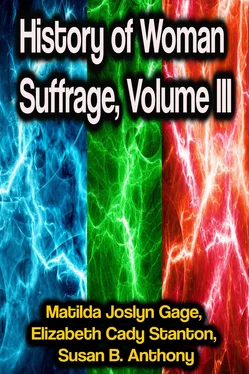In the adjustment of the question of suffrage now before the people of this country for settlement, it is of the highest importance that the organic law of the land should be so framed and construed as to work injustice to none, but secure as far as possible perfect political equality among all classes of citizens. In determining your right and power to legislate on this question, consider what has been done already.
As the national constitution declares that "all persons born or naturalized in the United States, and subject to the jurisdiction thereof, are citizens of the United States, and of the State wherein they reside," it is evident: First —That the immunities and privileges of American citizenship, however defined, are national in character, and paramount to all State authority. Second —That while the constitution leaves the qualification of electors to the several States, it nowhere gives them the right to deprive any citizen of the elective franchise; the State may regulate but not abolish the right of suffrage for any class. Third —As the Constitution of the United States expressly declares that no State shall make or enforce any law that shall abridge the privileges or immunities of citizens of the United States, those provisions of the several State constitutions that exclude citizens from the franchise on account of sex, alike violate the spirit and letter of the Federal constitution. Fourth —As the question of naturalization is expressly withheld from the States, and as the States would clearly have no right to deprive of the franchise naturalized citizens, among whom women are expressly included, still more clearly have they no right to deprive native-born women-citizens of the right.
Let me give you a few extracts from the national constitution upon which these propositions are based:
Preamble: We, the people of the United States, in order to form a more perfect union, establish justice, insure domestic tranquillity, provide for the common defense, promote the general welfare, and secure the blessings of liberty to ourselves and our posterity, do ordain and establish this constitution.
This is declared to be a government "of the people." All power, it is said, centers in the people. Our State constitutions also open with the words, "We, the people." Does any one pretend to say that men alone constitute races and peoples? When we say parents, do we not mean mothers as well as fathers? When we say children, do we not mean girls as well as boys? When we say people, do we not mean women as well as men? When the race shall spring, Minerva-like, from the brains of their fathers, it will be time enough thus to ignore the fact that one-half the human family are women. Individual rights, individual conscience and judgment are our great American ideas, the fundamental principles of our political and religious faith. Men may as well attempt to do our repenting, confessing, and believing, as our voting—as well represent us at the throne of grace as at the ballot-box.
Article 1, Sec. 9.—No bill of attainder, or ex post facto law shall be passed; no title of nobility shall be granted by the United States.
Sec. 10.—No State shall pass any bill of attainder, ex post facto law, or law impairing the obligation of contracts, or grant any title of nobility.
Notwithstanding these provisions of the constitution, bills of attainder have been passed by the introduction of the word "male" into all the State constitutions denying to woman the right of suffrage, and thereby making sex a crime. A citizen disfranchised in a republic is a citizen attainted. When we place in the hands of one class of citizens the right to make, interpret and execute the law for another class wholly unrepresented in the government, we have made an order of nobility.
Article 4, Sec. 2.—The citizens of each State shall be entitled to all the privileges and immunities of citizens in the several States.
The elective franchise is one of the privileges secured by this section approved in Dunham vs. Lamphere (3 Gray Mass. Rep., 276), and Bennett vs. Boggs (Baldwin's Rep., p. 72, Circuit Court U. S.).
Article 4, Sec. 4.—The United States shall guarantee to every State in the Union a republican form of government.
How can that form of government be called republican in which one-half the people are forever deprived of all participation in its affairs?
Article 6.—This Constitution, and the laws of the United States which shall be made in pursuance thereof, ... shall be the supreme law of the land; and the judges in every State shall be bound thereby, anything in the Constitution or laws of any State to the contrary notwithstanding.
Article 14, Sec. 1.—All persons born or naturalized in the United States, and subject to the jurisdiction thereof, are citizens of the United States.... No State shall make or enforce any law which shall abridge the privileges and immunities of citizens of the United States.
In the discussion of the enfranchisement of woman, suffrage is now claimed by one class of thinkers as a privilege based upon citizenship and secured by the Constitution of the United States, as by lexicographers as well as by the constitution itself, the definition of citizen includes women as well as men. No State can rightfully deprive a woman-citizen of the United States of any fundamental right which is hers in common with all other citizens. The States have the right to regulate, but not to prohibit the elective franchise to citizens of the United States. Thus the States may determine the qualifications of electors. They may require the elector to be of a certain age—to have had a fixed residence—to be of sane mind and unconvicted of crime,—because these are qualifications or conditions that all citizens, sooner or later, may attain. But to go beyond this, and say to one-half the citizens of the State, notwithstanding you possess all of these qualifications, you shall never vote, is of the very essence of despotism. It is a bill of attainder of the most odious character.
A further investigation of the subject will show that the constitutions of all the States, with the exception of Virginia and Massachusetts, read substantially alike. "White male citizens" shall be entitled to vote, and this is supposed to exclude all other citizens. There is no direct exclusion except in the two States above named. Now the error lies in supposing that an enabling clause is necessary at all. The right of the people of a State to participate in a government of their own creation requires no enabling clause, neither can it be taken from them by implication. To hold otherwise would be to interpolate in the constitution a prohibition that does not exist.
In framing a constitution, the people are assembled in their sovereign capacity, and being possessed of all rights and powers, what is not surrendered is retained. Nothing short of a direct prohibition can work a deprivation of rights that are fundamental. In the language of John Jay to the people of New York, urging the adoption of the constitution of the United States: "Silence and blank paper neither give nor take away anything." And Alexander Hamilton says ( Federalist , No. 83):
Every man of discernment must at once perceive the wide difference between silence and abolition. The mode and manner in which the people shall take part in the government of their creation may be prescribed by the constitution, but the right itself is antecedent to all constitutions. It is inalienable, and can neither be bought nor sold nor given away.
But even if it should be held that this view is untenable, and that women are disfranchised by the several State constitutions, directly or by implication, then I say that such prohibitions are clearly in conflict with the Constitution of the United States and yield thereto.
Читать дальше












